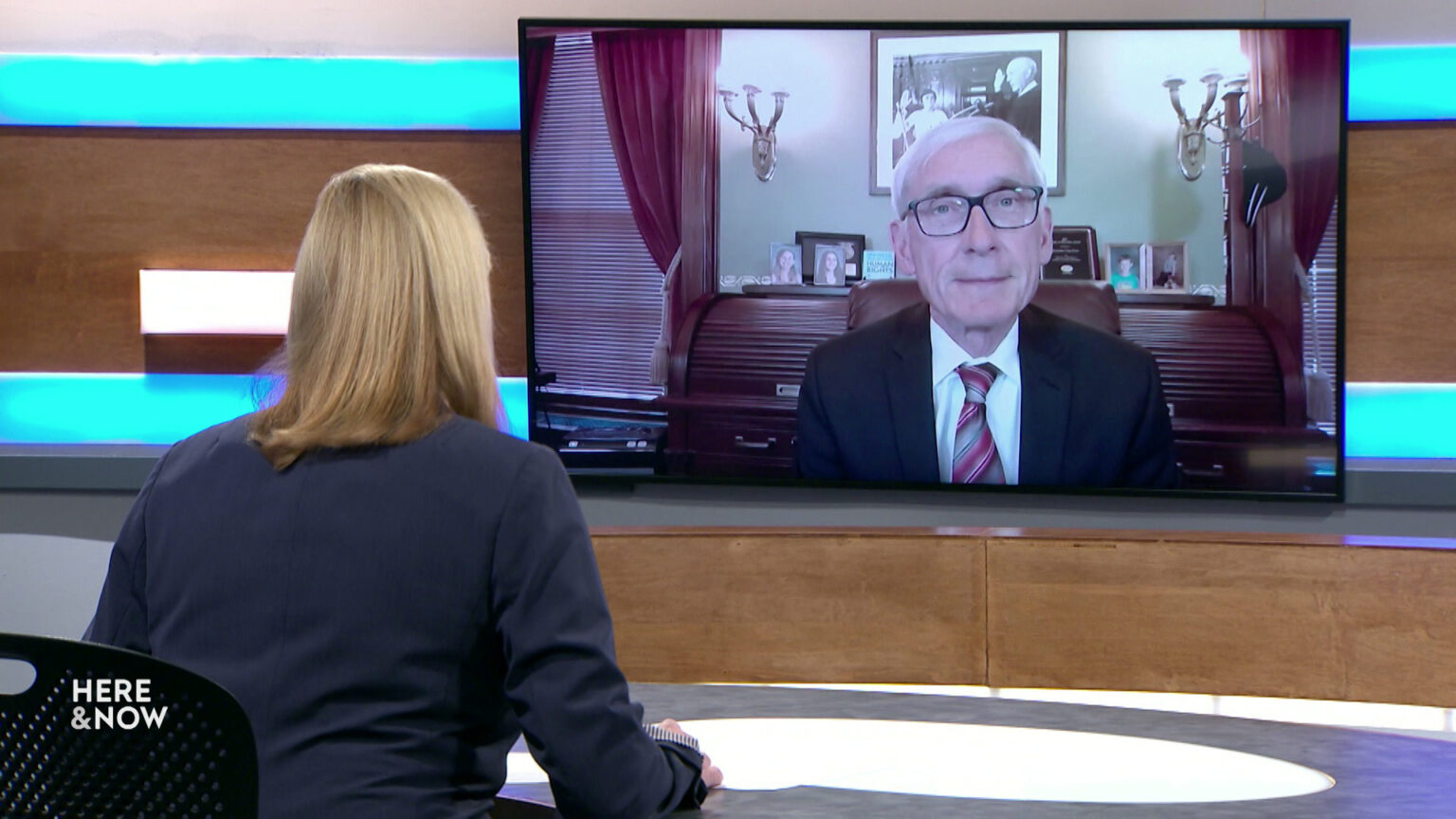'Here & Now' Highlights: Gov. Tony Evers, Mayor Satya Rhodes-Conway, Kati Anderson
Here's what guests on the July 7, 2023 episode said about the final state budget and its vetoes, promoting affordable housing in Madison and booming tourism in Bayfield County.
By Frederica Freyberg | Here & Now
July 10, 2023

Frederica Freyberg and Gov. Tony Evers (Credit: PBS Wisconsin)
Wisconsin Gov. Tony Evers, a Democrat, signed the biennial state budget into law and made 51 partial vetoes that included reversals of some income tax cuts and extensions to K-12 funding that are infuriating Republican legislative leaders. The state spending plan includes hundreds of millions of dollars toward affordable housing — Madison Satya Rhodes-Conway discussed the need for many more places to live in the growing city. The state budget also puts money into Wisconsin tourism, now hitting records post pandemic — a Bayfield business booster described what this growth means for the community.
- The nearly $99 billion biennial budget is now signed into law, but not without some remarkable partial vetoes from the governor. They include his veto of the Republican income tax cuts for the two highest tax brackets and the manipulation of digits in the budget’s text to extend K-12 per pupil increases from two years to 402 years. Republicans responded by saying Evers broke his word on compromise agreements for the budget, calling him a “radical.”
- Evers: “It’s laughable. You know, we actually came to some good bipartisan solutions during this budget, including issues around affordable housing and taking care of farmers and shared revenue. Good Lord. I mean, we just completely made a new system that is going to help municipalities do their important work. And, other ones, too — we’ve got to continue fixing our roads and bridges. So,, the idea that somehow this is radical is, in my view, ridiculous. We worked hard. We worked hard to get where we could.”
Satya Rhodes-Conway
Mayor, City of Madison
- The state budget includes $525 million toward affordable housing in Wisconsin, with provisions for building rehabilitation and converting commercial sites to housing units. The city of Madison is the fastest growing municipality in the state and with population growth comes a need for more housing. Rhodes-Conway said she welcomes any help from programs aimed at affordable housing in her city where mortgages and rent are increasingly pricey due to undersupply. She said Madison has changed zoning code to make it easier to build or add additional height because the need is so great.
- Rhodes-Conway: “I think really what we’re facing is that historically – and I’m talking for decades – Madison has underproduced housing. We have not kept pace with population growth. We have been growing as a city for quite some time and we just have not produced enough housing units. That’s why we find ourselves in the problem that we’re in now. And really the solution is to build more housing. And I when I say that, I mean every type of housing. We need more single family. We need more condos, more apartments. We need big buildings. We need small buildings. And so we’re trying to do anything we can to make it easier to produce housing.”
Kati Anderson
Public relations manager, Bayfield Chamber & Visitor Bureau
- Wisconsin tourism spending set records in 2022, and 2023 appears poised for the same trajectory. One tourist hot spot is Bayfield along Lake Superior in northern Wisconsin, which saw a 24% jump in visitor spending. Finding enough workers to sustain business generated by these crowds continues to be an issue. The biennial state budget includes millions of dollars for the Department of Tourism and for affordable housing initiatives.
- Anderson: “I think housing is really the biggest piece right now. One thing that was really encouraging here in Bayfield, a lot of businesses and new businesses popped up within the last year or two, and that was due to the Main Street Bounce Back grant. We had several businesses here — I know four off the top of my head for sure, who took advantage of that $10,000 funding. So things like that, initiatives like that do really well, could really help spur economic growth here in Bayfield, especially in Bayfield County, where our main industry here is tourism.”
Watch new episodes of Here & Now at 7:30 p.m. on Fridays.
 Passport
Passport











Follow Us